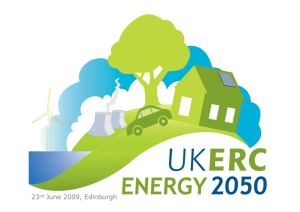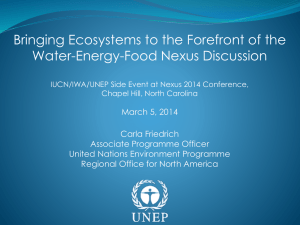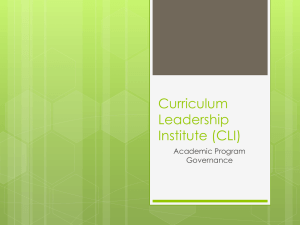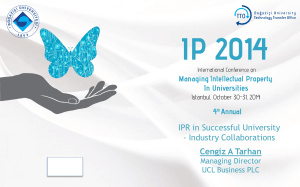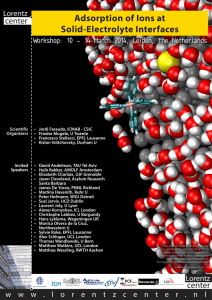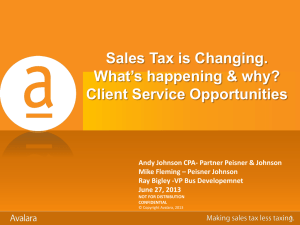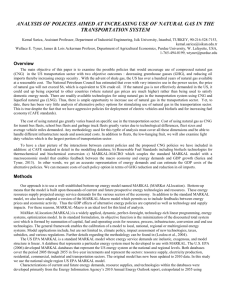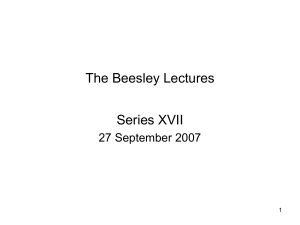Paul Dodds
advertisement
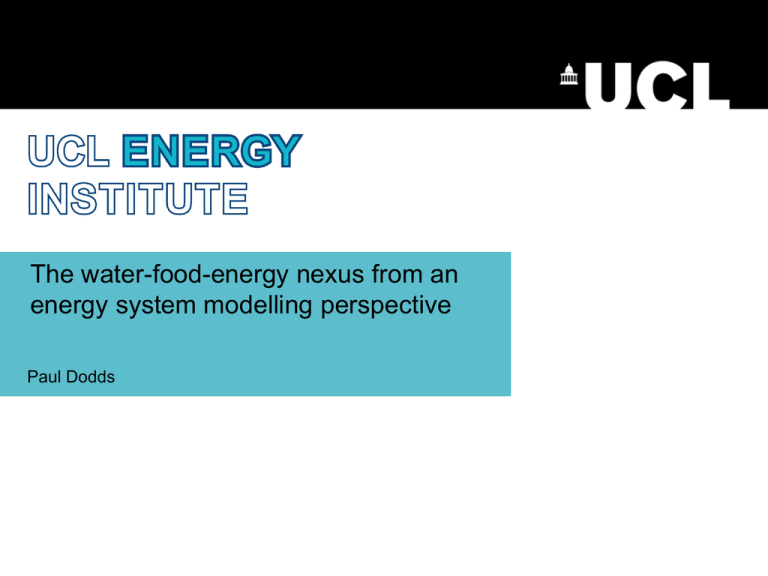
The water-food-energy nexus from an energy system modelling perspective Paul Dodds Introduction • Who we are and what we do • Energy system models • Initial thoughts on the water-food-energy nexus • Our interests in this research area Who we are and what we do • UCL Energy Institute (energy systems, buildings, transport) • UCL Institute for Sustainable Resources (food, bioenergy, water, mineral and petrochemical resources, and waste, from environmental, economic and policy perspectives) • Energy systems: – UK MARKAL energy systems model, which underpins UK government decarbonisation strategies. – TIAM (TIMES Integrated Assessment Model) is a global energy systems model with a climate component and a UK region • Policy work MARKAL modelling for UK policy Model type 2010 2007 2000 EWP 03 CAT Strategy STND STND Energy Review EWP 07 CC Bill CCC 1st report MACRO LCTP CCC & DECC analysis MED TIAM-UCL, Stochastic UK Government, CCC Funding UK Government UKERC, Research council projects, UK-Japan LCS, Ofgem, NGOs etc Rapid simple structured model development to inform EWP 03 CCS enhancement for CAT strategy Major 2 year UKERC programme; enhanced UK model with MACRO extension MED model development with major CCC and UKERC scenarios Stochastic MED model , Global TIMES model (UKERC) Assessing Energy, Economy, Engineering & Environment (E4) Interactions ENERGY AND ECONOMY GDP & CAPITAL REQUIREMENTS ENERGY SERVICES DEMANDS MINING LIMITS & TRADE (including IET) AVAILABILITY/CHOICE OF TECHNOLOGIES MARKALMACRO/ED ENVIRONMENTAL LIMITS ENVIRONMENT ENVIRONMENTAL EFFECTS 5 Characterisation of MARKAL/TIMES • • • • • • Linear Partial equilibrium Perfect foresight Bottom-up Energy-economic-environment-engineering Cost-optimisation • Energy flows, environmental constraints, economic and policy focus Energy Modelling typology Top-down Bottom-up Behaviour Simulation Econometric Optimisation Computable general equilibrium Macroeconometric Growth models Hybrid Models Integrated Assessment Models Climate Always a trade-off in model type, focus and implementation 8 Our questions on the water-food-energy nexus Self sufficiency Security Water How will climate change and population growth affect domestic and agricultural supplies? New investment? Will the price of water increase to an unsustainable level for part of the population? Food How will food production change in the future? Longterm trends and short-term variability How will local production and world food price trends and fluctuations affect the price of food for the UK population? Energy Will the UK become dependent on foreign energy supplies? How will climate variability affect future production? How will local production and world energy price trends and fluctuations affect the price of energy for the UK population? Our questions on the water-food-energy nexus • How can the UK government mitigate the impact of global water, food and energy shortages in the long term? • How could the impact of water, food and energy insecurities in other countries affect the UK? – Public disorder – Cross-border conflicts over resources – Mass migration • Are there economic opportunities for the UK caused by water, food and energy insecurities abroad? Water-food-energy interactions • Are there currently strong links between water, food and energy in the UK? • Could there be strong links in the future? – e.g. land uses for crops or bioenergy – with a high CO2 price, producing biomass could be much more lucrative for UK farmers than producing food in the future (McDowall et al. 2012). • Should we consider short-term phenomena (e.g. interrupted electricity supplies due to flooding)? UCL ISR research programme DEFINITIONS AND INDICATORS OF SUSTAINABILITY GREEN ECONOMY Resource depletion, air/land/water pollution, competing land uses, community impacts Infrastructure, innovation, policies for different economic sectors and localities, countries and the global economy PROGRAMME RESOURCE AREAS BIOTIC RESOURCES Water, soil, forests, food, habitats, biodiversity, ecosystems ABIOTIC RESOURCES Fossil fuels, metals, non-metallic minerals SPACE Land, Sea RESOURCE EFFICIENCY Technologies, innovation, institutions, governance, policies
